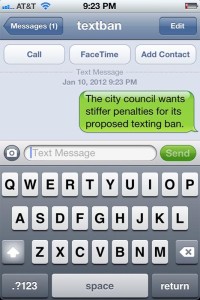 The Tucson City Council requested city staff revise the proposed texting ban to make the penalties stiffer and return it to the council for approval within 30 days.
The Tucson City Council requested city staff revise the proposed texting ban to make the penalties stiffer and return it to the council for approval within 30 days.
At its meeting last night council members listened to members of the public — who, for the most part, supported the ban — and determined they wanted to see a law with higher fines.
The proposed law would have fined people $100 for texting and $250 if the texting was determined to have caused a crash.
The council requested the fine be upped to $250 and $1000.
The council also suggested the law be a primary offense, which will allow officers to pull over drivers for texting. A secondary offense would mean they could only cite a driver for texting if they were pulled over for another reason.
Tucson Chief of Police Roberto Villaseñor said he was in support of anything that made the streets safer. He did say he was concerned about how the law would be enforced, but if it was approved he said the department would do their best to enforce the law.
Representing Living Streets Alliance, BICAS employee Kylie Walzak spoke to the council about the law and urged them to approve it.
She said after the meeting she was thrilled that the council was attempting to make the law even more strict.
You can review the original law here.

Fantastic!! Thank you to everyone who went and helped the council reach this very important decision. I am sorry I was unable to attend , good work everyone.
Ignacio
Yesterday I was riding home on Limberlost coming from Trader Joe’s and a car passed me and he was reading his texts while driving. If this passes, I really hope they enforce it.
I was heading north on Houghton towards Tanque Verde yesterday, and a driver coming the other direction veered onto the yellow dividing line as he stared at something on the passenger seat. The drivers around here are amazingly careless.
All five of them. Whopping huge turn out. 4 in favour, 1 against
Can anyone make a law? How are laws made? $250 and $1000 is too much. The $1000 part is insane. That’s like paying $500 for parking in the handicapped space.
Phoenix has a similar law, 7 citations in 5 years. This is going to be tough to enforce. If I were a police officer contemplating writing a ticket I’d want to know that the odds of it being upheld in court were high. This is a lot like the public consumption of alcohol law which is rarely enforced because it’s so difficult to actually catch someone in the act. Something that worries me if this is enacted as a primary stop law is that it will be used as a pretext to stop people. I thought you were texting, mind if I search your vehicle? The proposed law only talks about texting, golly officer I was dialing a call.
None of the above is to imply that I think anyone should text while driving or even stopped at a light. Ride a bike, you can see into cars. So many people are texting. We need a solution to this problem, this one is oblique at best and yes I’m aware of the deterrent claim. An unenforceable law that will scare all those errant texters into compliance. Karin Uhlich’s antecdotal accounts of going to a new city and being warned by the cab drivers don’t text you’ll be ticketed weren’t very compelling.
…..mind if I search your vehicle?……
“Yes, officer, I do mind”, Should always be the answer in that situation. Same for your bike panniers. They know that they need your permission and will not tell you that you don’t have to give it.
A law is just a law. People want ‘the village’ to help with the responsibility raising their kids, but don’t want to be part of the village when it comes to stopping the carelessness, or the rudeness, or the negligence or the violence.
Where does somebody learn to shoot someone while they are out walking their dog?
absolutely no upside to saying yes ever.
Regarding stopping the carelessness,the rudeness, the negligence or the violence I tend to view texting as a symptom of a much larger problem that’s really about how we as a society have allowed ourselves to be seduced by the promise of the efficiency and then tyrannised by motor vehicles.